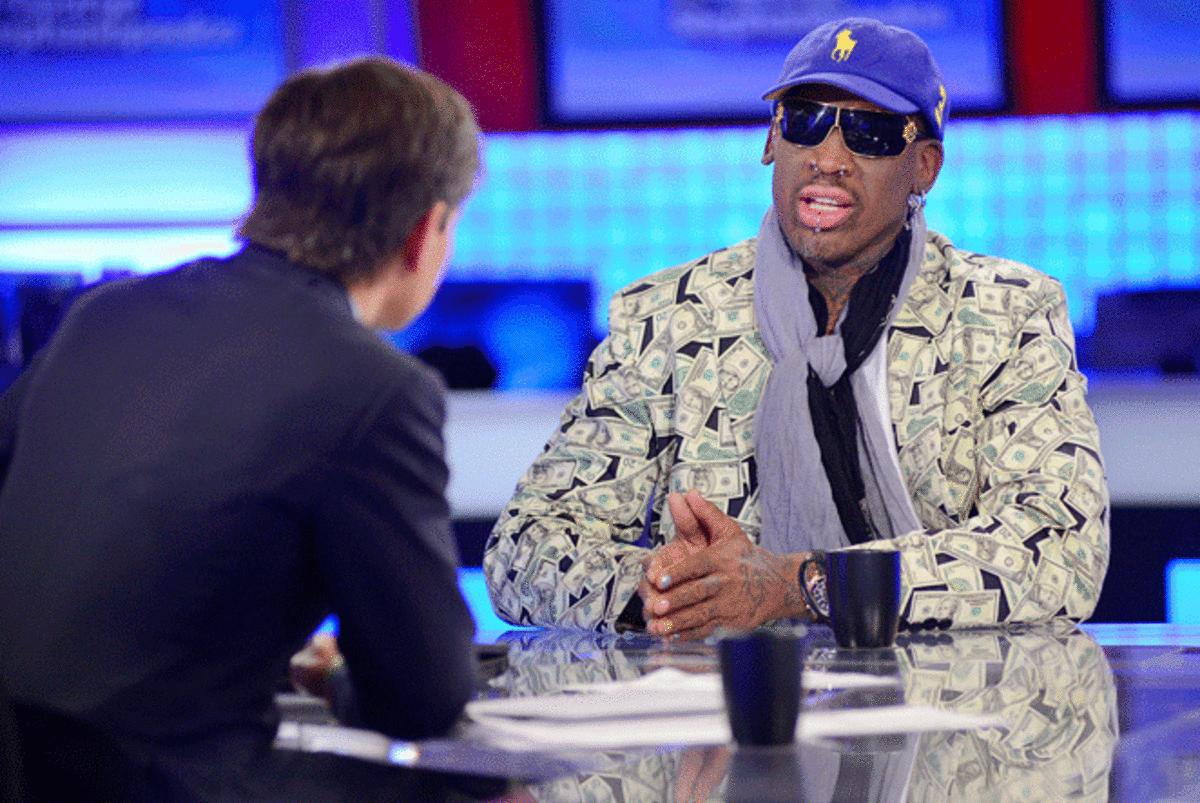
Incoherent rambling a regular part of the sports conversation

Dennis Rodman's ranting about North Korea on ABC's "This Week" with George Stephanopoulos was comically incoherent.
/ABC
There was a moment near the end of their televised summit meeting on Sunday morning when George Stephanopoulos handed Dennis Rodman a report by Human Rights Watch detailing myriad atrocities committed by the North Korean dictatorship. The newsman suggested Rodman read it before his next visit to the totalitarian state, whose overlord, Kim Jong-un, has become the former Bull's unlikely BFF.
The Worm, resplendent in mauve scarf and blazer emblazoned with dollar bills, was ready with a rejoinder: "Well either way, either way, guess what, though?" he told Stephanopoulos. "Guess what? Thank you for the report. Guess what? Guess what? Don't hate me. Don't hate me. Guess what? Don't hate me. Guess what? Don't hate me."
The broadcast was wrapping up, and the home viewer longed for Stephanopoulos to reply as the principal did in Billy Madison when the title character gave a less-than-lucid answer in a high school quiz competition:
"Mr. Madison, what you just said is one of the most insanely idiotic things I have ever heard. At no point in your rambling, incoherent response were you even close to anything that could be considered a rational thought. Everyone in this room is now dumber for having listened to it. I award you no points, and may God have mercy on your soul."
Alas, that didn't happen. Instead, the anchor thanked his guest for joining him and mercifully threw to commercial, putting a temporary stop -- very temporary, as it turned out -- to a new-ish phenomenon. Where once public figures issued self-righteous denials (or an opaque "No comment") in response to uncomfortable questions, many now prefer a more effective technique: The Incoherent Ramble.
The Incoherent Ramble evades questions, and follow-ups, in the way that Adrian Peterson eludes tacklers, and for nearly as long. And so a basketball Sunday that began with Rodman's rambling ended with a nationally televised Thunder-Clippers game that saw Serge Ibaka punch Blake Griffin in the groin.
Questioned afterwards, Ibaka explained himself with a classic incoherent ramble, as transcribed by The Oklahoman: "He's strong, so when he grabs you, your jersey or whatever, and you try to defend yourself and rebound. So maybe you can do some move, not to hurt, (but) just to get good position, but then something happens where you get hurt in the paint. It's not anything where I want to try to hurt him. I'm not that kind of person. I just try to play hard, and that's it. I just tried to play hard. I really don't care if someone is dirty or not, that's not my problem."
The art of the incoherent ramble is on fullest display in presidential debates, in which candidates are asked a question, ignore that question, then begin wandering off syntactically like an old man sleepwalking in his pajamas, so that all future debates ought to be introduced by Michael Buffer shouting: "Let's get ready to ramble!"
As a columnist, I know all about the rambling, incoherent soliloquy -- I write them all the time -- and am something of a fan of it. Perhaps it's a case of Stockholm Syndrome, having heard so many of them over the years, but to me the incoherent ramble says: I'm not going to lie to you. I'm not going to tell you the truth, either, but you can read into my evasions and discursions a passive acknowledgement of the elephant in the room.
In February, lawyers for Barry Bonds asked a federal appeals court to overturn their client's conviction for obstruction of justice. That single conviction stemmed from the slugger's rambling answer to a 2003 grand jury question on whether his personal trainer ever gave him anything that required injection with a syringe.
The answer that Bonds gave alluded to his own father's playing career: "That's what keeps our friendship. You know, I am sorry, but that -- you know, that -- I was a celebrity child, not just in baseball by my own instincts. I became a celebrity child with a famous father. I just don't get into other people's business because of my father's situation, you see."
But of course you don't see, which was rather the point of Bonds' answer, and all answers like it: To hang a curtain of fog so dense and impenetrable, so brazenly baloney-filled, that you can't see through it with night-vision goggles. Yet anyone hearing it -- from Bonds or Rodman or Mark McGwire before the Senate all those years ago -- might reasonably conclude that the speaker is trying to say "Yes" but is physically incapable of doing so, the way Fonzie was incapable of saying "I was wrong."
It's a bold move, and is best attempted from behind sunglasses, as Rodman did on Sunday, lending further ambiguity to his answers. But they really weren't ambiguous at all, were they? At the risk of coining an oxymoron, their opacity was transparent.




